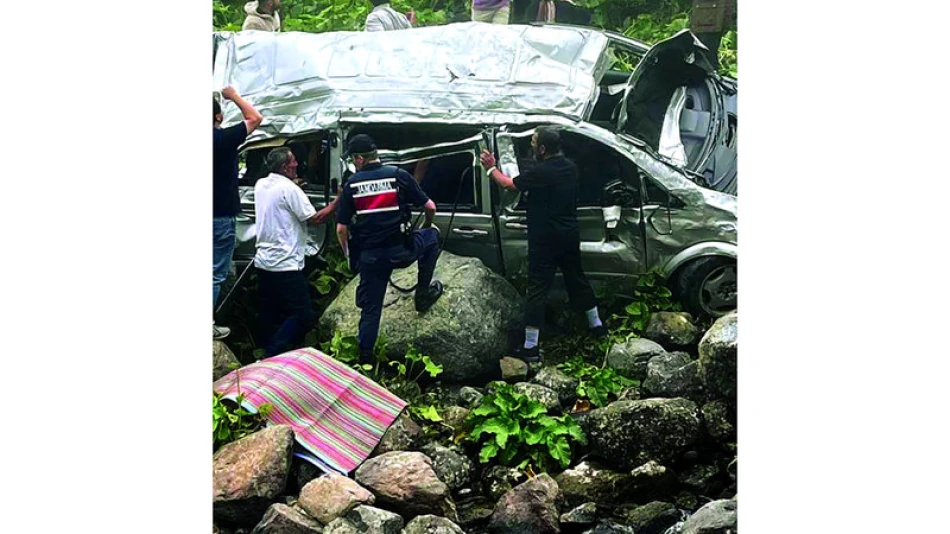
Tragic Journey: Widow of Turkey Accident Victim Shares Harrowing Story
Turkish Tourist Bus Crash Exposes Safety Concerns as Emirati Family Tragedy Unfolds
A devastating tourist bus accident in Turkey's Trabzon province has claimed the lives of two Emirati nationals and left three family members hospitalized, raising serious questions about tour operator safety standards and driver oversight in one of the region's most popular tourist destinations. The incident, which occurred during what was meant to be a family's first vacation to Turkey, highlights the vulnerability of international tourists to local transportation risks.
Final Phone Call Reveals Driver's Reckless Behavior
Naima Idris, widow of victim Abdul Majeed Mohammed Ahmed Ibrahim, revealed that her husband's last phone call at 1 PM on the day of the accident contained an alarming warning. "He told me the bus driver was driving very recklessly," she told local media. The 32-year-old had traveled with his parents and siblings to Trabzon, leaving the UAE on Thursday for what was planned as their first family trip to the Turkish coastal city.
Idris, who was five months pregnant and unable to join the trip, described how the family's excitement quickly turned to tragedy. Just one day after their arrival, the tourist bus carrying the family to Fish Lake (Balık Gölü), a popular scenic destination, crashed into a 50-meter ravine.
Eyewitness Account Points to Road Rage Incident
According to the surviving family matriarch, the crash was precipitated by an apparent road rage incident. The bus driver allegedly engaged in a confrontation with another vehicle traveling slowly on the mountain road, then dangerously overtook it at high speed on a treacherous curve. Moments later, the driver lost control, sending the vehicle plunging down the steep embankment.
The accident claimed the lives of Abdul Majeed, 32, and his sister Maryam, 18. Three other family members remain hospitalized, with 15-year-old Ibrahim in critical condition requiring intensive care, while the family patriarch, Mohammed Ahmed Ibrahim, 60, needs urgent surgery for multiple fractures to his elbow, forearm, and finger, plus head injuries.
Turkey's Tourism Safety Under Scrutiny
This tragedy occurs as Turkey continues to position itself as a premier destination for Middle Eastern tourists, particularly from the Gulf states. Trabzon, with its Black Sea coastline and mountainous terrain, has become increasingly popular among Arab visitors seeking cooler climates and natural beauty. However, the region's challenging topography and winding mountain roads present inherent risks that tour operators must carefully manage.
The incident bears similarities to other tourist transportation accidents in mountainous regions worldwide, from the Swiss Alps to Nepal's Himalayas, where inadequate driver training and vehicle maintenance have led to preventable tragedies. Unlike established destinations with stringent tour operator regulations, Turkey's rapid tourism expansion may have outpaced safety infrastructure development.
Legal Consequences and Industry Implications
Turkish authorities have detained the bus driver pending investigation, while both judicial and administrative inquiries are underway. The Trabzon governorate confirmed that the vehicle was operated by a private company under European Union management standards, though this certification clearly failed to prevent the reckless driving that led to the crash.
For Turkey's tourism industry, which welcomed over 51 million visitors in 2023, this incident represents more than an isolated tragedy. Gulf state visitors, who contribute significantly to Turkey's tourism revenue, may reconsider their travel plans if safety concerns persist. The UAE, in particular, has strong diplomatic and economic ties with Turkey, making this accident a potential diplomatic issue requiring careful handling.
Broader Regional Tourism Safety Concerns
This accident highlights a broader challenge facing emerging tourism destinations across the Middle East and Mediterranean. While countries like the UAE and Singapore have implemented rigorous transportation safety standards, nations rapidly expanding their tourism sectors often struggle to maintain consistent safety protocols across all operators.
The incident also underscores the importance of travel insurance and safety briefings for international tourists. Many Gulf travelers, accustomed to highly regulated domestic transportation systems, may not fully appreciate the risks associated with mountain tourism in less regulated environments.
As Turkish authorities continue their investigation, the focus will likely shift to whether existing tour operator licensing and driver certification programs are adequate for the country's ambitious tourism goals. The tragedy serves as a stark reminder that sustainable tourism growth must prioritize visitor safety alongside economic benefits.
Most Viewed News

 Sara Khaled
Sara Khaled






